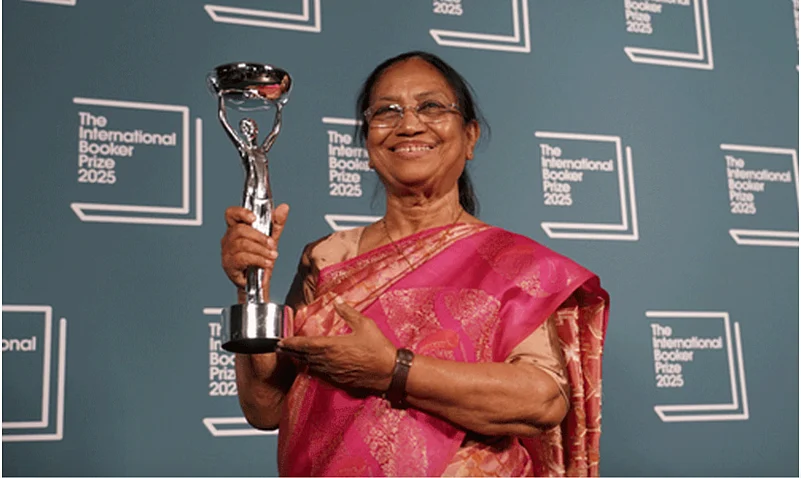In her International Booker acceptance speech on May 20, 2025, Kannada writer-lawyer-activist Banu Mushtaq thanked readers for letting her stories “wander into their hearts” and Deepa Bhasthi, who translated her collection ‘Heart Lamp’ from Kannada into English, for letting her words sail across borders. ‘Heart Lamp’ is the first book written in Kannada to be awarded the International Booker Prize, a coveted honour for translated works globally. Bhasthi is the first Indian translator to win the award. The 2022 winner of the International Booker, Geetanjali Shree’s Hindi novel ‘Ret Samadhi’ (translated into English by Daisy Rockwell), is the first book in an Indian language to receive the prize.
Alongside ‘Heart Lamp’, the shortlisted works on the International Booker list this year were ‘On the Calculation of Volume I’ by Solvej Balle, (translated from Danish by Barbara J. Haveland); ‘Small Boat’ by Vincent Delecroix, (translated from French by Helen Stevenson); ‘Under the Eye of the Big Bird’ by Hiromi Kawakami, (translated from Japanese by Asa Yoneda); ‘Perfection’ by Vincenzo Latronico, (translated from Italian by Sophie Hughes); and ‘A Leopard-Skin Hat’ by Anne Serre, (translated from French by Mark Hutchinson). Innovative in both form and content, these books cover a wide spectrum of human experience, raising crucial questions about survival, love, faith, memory and the climate crisis.
The Booker judges have hailed Mushtaq’s collection as a “radical translation”, which offers English readers something “genuinely new”. Mushtaq is overjoyed that her stories about the struggles and dreams of Muslim women in South India; lived experiences shared under the shade of the banyan tree in her little village in Karnataka; have made it to the Booker stage. She sees it as a win for diversity; a reaffirmation of the fact that literature can bring us closer in an age of conflict. The win has strengthened Mushtaq’s vision of building a global community where “every story matters; every voice is heard.”
A native of Hassan, Karnataka, Mushtaq, who has close ties with Kannada literature’s progressive Bandaya movement, has always written about those who are relegated to the margins. Rejecting religious dogma; class and caste divisions; and fiercely championing women’s rights, her stories are seeped in the suffering and resilience of women from the Muslim community in south India. Quick-witted grandmothers, sharp-shooting daughters, exploited mothers and stoic wives, controlling husbands, dogmatic religious leaders—her cast of characters is vivid and unforgettable. Being a “critical insider”, Mushtaq has faced criticism and threats since she started writing in the 1970s. Though labelled too “outspoken” by many in her community, she has never self-censored. Bravely, she continues to write, giving a voice to those who are silenced or hemmed into the margins. Mushtaq’s mother tongue is Dakhni Urdu. Kannada is the language she writes and dreams in. Her works have been translated into Urdu, Tamil, Malayalam, Punjabi and English; and she was awarded the Karnataka State Sahitya Academy award in 1999.
Kannada has a rich literary tradition and many a short story writer has blazed a trail in its firmament. One of the oldest spoken languages in the world, Kannada has approximately 65 million speakers. Mushtaq’s Kannada highlights the cosmopolitan character of Kannada, which is enriched by the influence of languages such as Dakhni, Persian and Arabic, among others.
Kannada readers have embraced the short story form over the years, thanks to magazines and periodicals which published and popularised them. Mushtaq, who is currently working on a
memoir and a collection of short stories, remains a votary of the short story. Her Booker win bodes well for the form and is sure to entice more readers to appreciate the beauty, scope, power and thematic brilliance of short stories.
In 2017, the English translation of well-known Kannada writer Vivek Shanbag’s novel ‘Gachar Gochar’ (translated by Srinath Perur) garnered international acclaim when it was named one of the finalists in the fiction category of the Los Angeles Times Book Prize. The novel was also a finalist for the Dublin Literary Award. Spare and emotionally resonant, ‘Gachar Gochar’, the story of a middle-class family in Bangalore, quickly earned a loyal following of readers. Translations in a number of languages—Indian and international—were published. Shanbag’s popularity is one among many recent instances of narrative with a distinct local flavour resonating with global audiences.
The 2025 International Booker win, and Bhasthi’s English translation, are sure to invite more readers—no matter where they live or what tongue they speak in—to step into Banu Mushtaq’s world. Her stories hum with the cadence of Kannada and lay bare the hearts of women who are wounded, silenced, rejected; people who endure and people who resist. They talk about pain and loss, about loving and leaving, nurturing and hoping; these stories speak the universal language of human experience, which is bound to resonate across cultures.

















